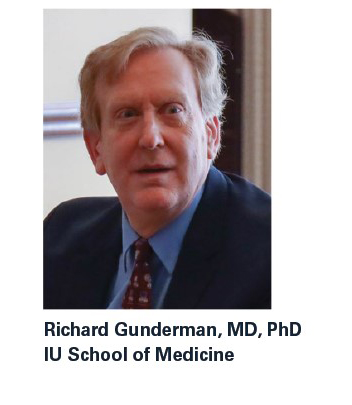By: Richard Gunderman, MD, PhD
IU School of Medicine

Some people in leadership positions in medical practices, hospitals, and health systems act as though all that is necessary to advance health care is to perfect systems, effectively taking individuals out of the picture.
They believe that instead of relying on individuals' expertise, experience, and dedication, we need to create and rely on better systems: hospital information systems, clinical pathways and algorithms, and incentive compensation plans. Some leaders also believe that deep learning and artificial intelligence will gradually replace individual physicians and nurses in the best of all possible worlds, improving compliance, cutting costs, and enabling management directives to be implemented instantly and without resistance.
Such attitudes can take a real toll on physician well-being. For one thing, they present health professionals as obstacles to progress, too concerned with protecting our own jobs and incomes and too resistant to the new AI-dominated future of health care. Secondly, they suggest that health professionals are or will soon be rendered redundant, even irrelevant -- no more integral to health care than the bygone use of cigarettes to treat respiratory complaints. Finally, they suggest that whatever health care may be, it does not require health professionals at the bedside. Presumably, health care organizations will always require human executives to lead and manage them, but the patient-facing professionals on the front lines of health care can and should be replaced as soon as possible.
Yet there is a problem with efforts to “design out” the physicians and nurses on the front lines, to turn us into decision implementers instead of autonomous professionals whose practical wisdom plays a crucial role in caring well for patients. The people in the C-suite necessarily operate with a distanced and abstract notion of what is happening between the patients and the patient-facing professionals caring for them. They can track metrics such as wait times, compliance data, and satisfaction scores, but they usually lack a deep understanding of what makes each patient and each patient encounter distinctive, a perspective that holds the key to caring well. To suppose that we can understand patient care by focusing exclusively on generic data generated by every patient encounter is to fail to understand what the practice of medicine really is.
We can make patient care more efficient, less costly, and less variable – overarching goals of many health care executives – while simultaneously undermining the quality of care and the morale and dedication of the patient-facing professionals who do the caring. To treat health professionals as obstacles that need to be engineered out of the process is to mistake medicine for a mere process, like making widgets. A widget manufacturer might reasonably seek to automate the production process as much as possible, reducing defect rates and lowering costs, but a patient is not a widget and neither is a health professional. Medicine is an inherently human enterprise, necessarily practiced by human beings for the benefit of human beings, and human excellences must be able to shine through.
Sometimes reducing efficiency is exactly what is called for. Following instructions works only as long as the instructions work, and as any health professional knows, the unforeseen often supervenes. And in many cases, the unexpected – whether it occurs in the emergency department, the operating room, or the clinic – is not a defect to be engineered out of patient care but an opportunity for the expression of excellence in it. Physicians know something vital that many health care executives may not – that human beings are incredibly complex, idiosyncratic, and wondrous creatures who cannot in good conscience be handled as widgets moving down a production line. Treating everyone who can be assigned to a particular category the same often leads to failure, and the ambition to do so flies in the face of essential human dignity.
Henry David Thoreau warned that human beings are becoming the tools of our tools. Instead of technology serving humanity, human beings are becoming the servants of technology, and those who dream of efficiency and profit maximization increasingly talk about health professionals as impediments to the implementation of their designs. Physicians are increasingly made to feel like cogs in machines whose strategic plans and metrics barely glimpse the flesh-and-blood patients we care for each day. For non-patient-facing managers to understand what this amounts to, they need to imagine one of their own loved ones – parent, spouse, child – being treated by a computer algorithm as a member of a diagnostic category, as opposed to a flesh-and-blood human being who can look them in the eye, hold their hand, and even shed a tear alongside them.
The poet T.S. Eliot had it exactly right almost a century ago when he wrote in “The Rock”:
“They constantly try to escape
From the darkness outside and within
By dreaming of systems so perfect that no one will need to be good.”
Computers can answer quiz-show questions, and robots can hit baseballs better than human beings, but there is something essential in human drama that helps to explain why we are not lining up to watch various AI programs compete with one another. We have an inborn attraction to human goodness and an innate aspiration to perform well and become good ourselves. To seek to deprive health professionals of the opportunity to be good is to deprive us of our humanity and, in the process, dehumanize the patients whose care defines our excellence.
Richard Gunderman, MD, PhD, is the chair of the ISMA Wellness Steering Committee.